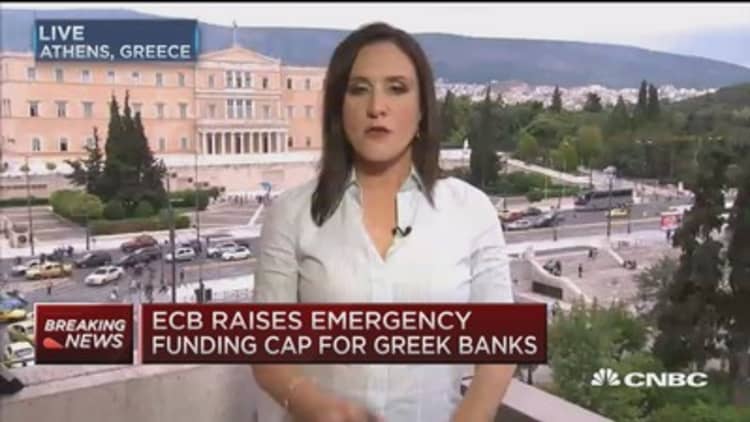


The European Central Bank has raised the funding cap on its emergency backing for Greece's banks, but there are still worries that they may be the first domino to fall in the path to a possible exit of Greece from the euro zone.
The ECB raised the funding cap on its Emergency Liquidity Assistance (ELA) for Greece's banks by 3.3 billion euros ($3.7 billion) Friday, according to a CNBC source.
The decision, made in a conference call Friday and first reported by Reuters, followed a meeting of the euro zone's finance ministers on Thursday, where the ability of the country's lenders to open up for business next week was questioned.
It comes as a specter of a run on Greek banks is looming, after yet another round of failed rescue-for-reforms talks.
The valuation of the Greek banking sector has fallen by nearly a third since the start of June as concerns about the risk of Greece leaving the euro zone grow.
On Friday morning, banks were open in Athens city center and there seemed to be a steady stream of people making withdrawals at ATMs, as observed by CNBC. The mood appeared calm and there weren't any lines forming; it was difficult to judge whether the banks were any busier than usual on a Friday morning.
Of course, measuring ATM queues doesn't take into account the number of people transferring money in other ways. Also, Greece is still an economy where many of the transactions that are done via credit cards in other Western countries are regularly done in cash.
Yannis Stournaras, governor of the Bank of Greece, Greece's central bank, said on Friday that he "confirms the stability of the banking system."
There are still a number of moving parts governing what will happen to Greece's banking system, however.
Bank run or jog?
Let's not forget, there has already been plenty of money pulled out of Greek banks.
Capital flight out of the country's lenders has been steady since the financial crisis began in 2010, but it has intensified in recent weeks.
So far this year, 40 billion euros ($45 billion) – around 25 percent of deposits - have left Greece's banking system, according to Citi estimates. On Thursday alone, deposit outflows were above 1 billion euros, according to a Reuters report.
ECB’s tough choices
Greek banks have been able to cope with these outflows because of the ECB backstop.
There is no doubt that Greek banks need this funding. Eurosystem aid - from the ECB and other euro zone central banks - is now around 31 percent of the banking system assets, according to Citi calculations.
On Monday, ECB President Mario Draghi told European lawmakers that, so far, the bank had helped out Greek lenders to the tune of 118 billion euros ($133 billion) – about 66 percent of Greece's overall economy. At the end of 2014, that sum was only half the current level.
Three options were under discussion at Friday's ECB meeting, according to CNBC sources with knowledge of the situation.
The first was immediately stopping ELA, triggering a collapse of the banking system.
The second was not increasing ELA – which would trigger capital controls, limitations placed on the movement of capital which are usually associated with struggling emerging market economies.
The third was to increase ELA, which Greek banks had requested, and has now taken place according to a CNBC source.
A two-thirds majority would have had to be in favor of one of these options.
- By CNBC's Catherine Boyle. CNBC's Annette Weisbach in Frankfurt and Katie Slaman in Athens contributed to this report.




